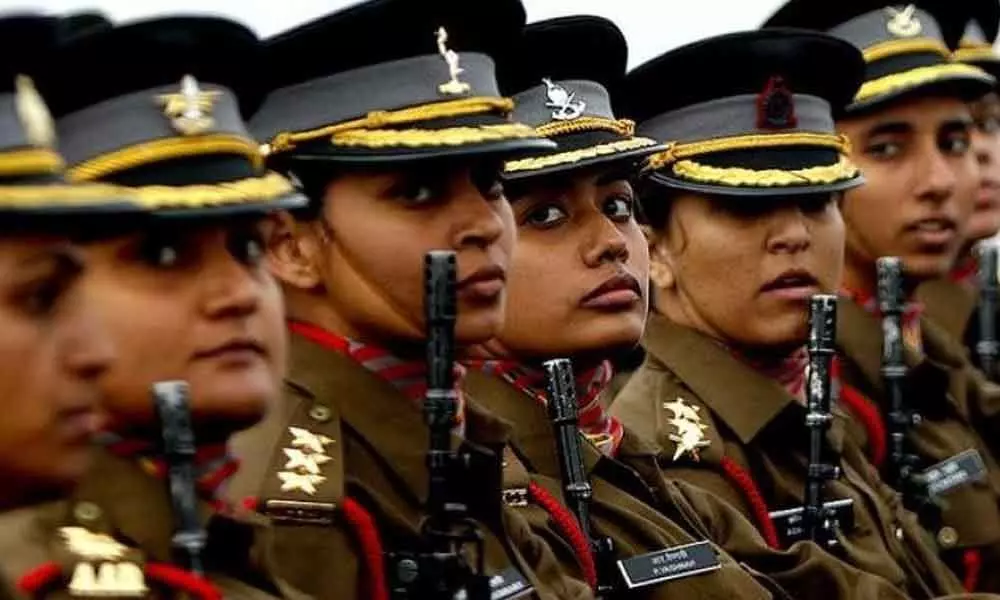Live
- ‘Daaku Maharaaj’ to kickstart musical promotions
- ‘Game Changer’ team teases with a new promo
- Nara Lokesh emphasises overhaul of govt. schools and mid-day meal program
- Amid turmoil, air pollution peaks in Bangladesh as temperatures fall
- Google Trends unveils list of most searched ‘Indian Movies of 2024’
- BGT 2024-25: Hazlewood signals readiness for Brisbane Test after training with full run-up
- Google Presents Deep Research AI Tool for Comprehensive Web Reports
- Share of top 50 stocks to total market cap at all-time low: Report
- Nortje ruled out of SA’s remaining white-ball matches against Pakistan
- Mamata doesn't want INDIA bloc to succeed, claims BJP's Rahul Sinha
Just In

New Delhi: The Supreme Court on Wednesday said if there is a will and a change in mindset on the part of the government, then women officers could be...
New Delhi: The Supreme Court on Wednesday said if there is a will and a change in mindset on the part of the government, then women officers could be allocated command posts in the Indian Army.
A bench headed by Justice D.Y. Chandrachud and comprising Justice Ajay Rastogi made this observation while hearing a petition for permanent commission for women in the Army.
Senior advocate R. Balasubramaniam, representing the Ministry of Defence, said there are no rules in the appointments, which contribute towards gender-based discrimination for promotion, appointments, etc. He also emphasised that all provisions and rules apply equally to both men and women, and any proposition of gender discrimination is misplaced.
Solicitor General Tushar Mehta told the court that women are better than men, and clarified that he did not contend that men cannot take commands from women. Justice Chandrachud said that the time has come when the Centre could implement induction of women in the Army and give them command posts. The court also observed there are two things that are required to remove any form of gender discrimination -- "administrative will and change in mindset."
The Centre has informed the apex court that "motherhood, child care, psychological limitations" are vital factors, which have a bearing on employment of women officers in the Army. Mehta argued that lower physical standards of women, composition of units that are entirely male mostly from rural backgrounds impacts commander appointments.
Justice Chandrachud replied that a combat role comprises only a fraction of the role in the military where women have not been inducted, if it were to be assumed they were not fit for this role. Mehta replied different physical standards were a reality in a combat situation, and also there is a danger if women were taken as prisoners of war.
However, the apex court insisted if the government were to change its mindset then women officers could be "given command posts in the Army as there are many other services in addition to combat operations where women could be accommodated".
The court observed that it will consider applications of all women officers, who are in service and who aren't, and the ones who are will be governed through the judgement. The court denied passing separate orders.
The petitioners, represented by senior advocates Meenakshi Lekhi and Aishwarya Bhati, argued the discrimination has been prevalent from the beginning. They insisted that Short Service Commission (SSC) was introduced in 2006 and women had an option, if they wanted to be governed by the old policy.
The petitioners' counsel said there is a significant difference in the training for the SSC, which is 11 months, and the Indian Military Academy which is 18 months' training. The latter has permanent entry. Those who transition from SSC to permanent commission do not get to surpass those who have passed IMA.
The court has reserved the order and asked all parties concerned to submit all notes and submissions by Friday, and also said that similar petitions pertaining to the Air Force and the Navy will be taken up next week.

© 2024 Hyderabad Media House Limited/The Hans India. All rights reserved. Powered by hocalwire.com







